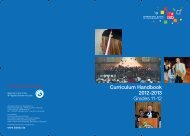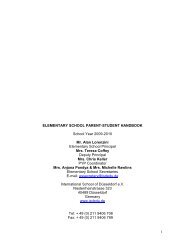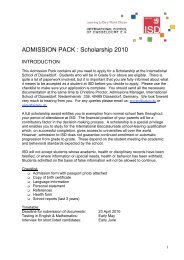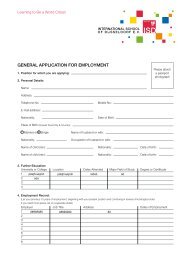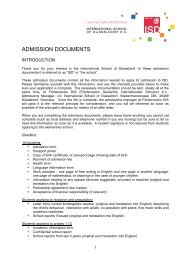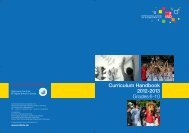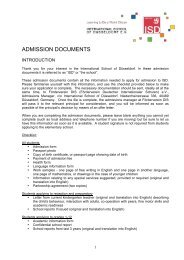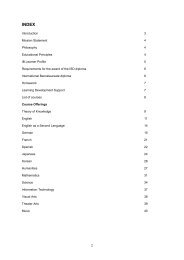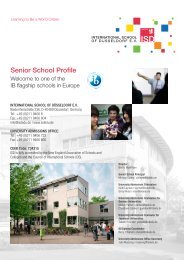SENIOR SCHOOL STUDENT - PARENT HANDBOOK
SENIOR SCHOOL STUDENT - PARENT HANDBOOK
SENIOR SCHOOL STUDENT - PARENT HANDBOOK
You also want an ePaper? Increase the reach of your titles
YUMPU automatically turns print PDFs into web optimized ePapers that Google loves.
o “EE” (exceeding expectations) means that the student is doing very<br />
well indeed.<br />
o “IE” means that the student has presented insufficient evidence for<br />
an evaluation to be made. The teacher should find out why the<br />
student has presented insufficient evidence and arrange with him<br />
that he produce the missing evidence within an appropriate time<br />
frame.<br />
o “N/A” means that the particular criterion or skill has not yet been<br />
addressed in the class during the given marking period.<br />
• Academic achievement grade (January and June reports for G11 &<br />
12; June report only for G6-10) is the teacher’s professional estimate<br />
of the student’s best sustained performance i.e. the level at which the<br />
student has performed, or demonstrated the ability to perform, over a<br />
significant proportion of the assessment period. (see above p.16).<br />
This grade relates solely to individual, “pure” academic<br />
achievement i.e. the individual student’s progress towards the<br />
acquisition of the course-related knowledge and skills, as defined by<br />
the course criteria, and does not include other variables such as<br />
behavior, effort, attitude, temperament etc. unless they are specified in<br />
a criterion descriptor.<br />
• Strengths and Targets: in this section the teacher answers the<br />
questions “what does the student do well?” and “what should she do to<br />
improve her learning?” He also addresses personal engagement and<br />
any issues related to other sections of the report.<br />
14. <strong>STUDENT</strong> PROGRESS CONFERENCES<br />
One formal Parent-Teacher Conference is held towards the end of January.<br />
It is also possible, through the senior school office, to arrange other<br />
appointments when necessary throughout the school year.<br />
15. STUDY/UNSCHEDULED PERIODS<br />
As students move up in grade level they are expected to work more<br />
independently. There may be unscheduled (not “free”) periods in each<br />
higher-grade student’s daily schedule. G6-9 students do not have<br />
unscheduled periods and they are rare in G10. During such study periods<br />
students are expected to work in the Library, unused classrooms, or the<br />
café. 12 th grade students may sign out to leave campus during these<br />
periods.<br />
27



